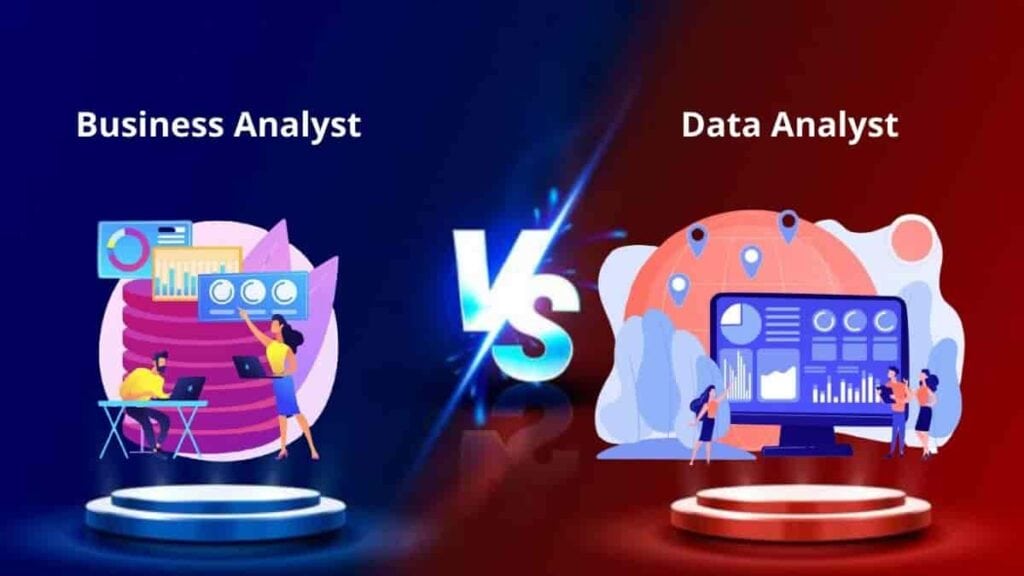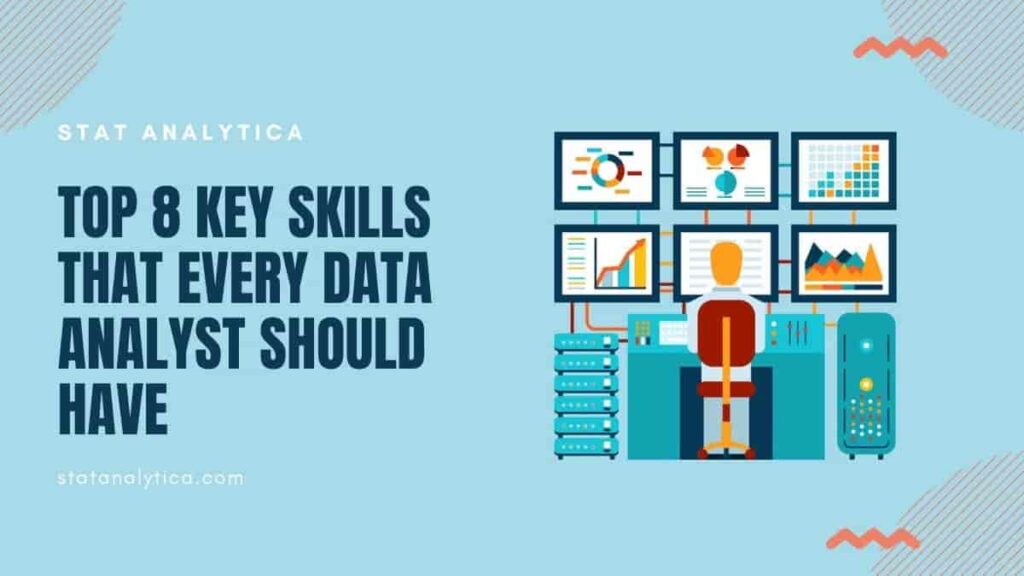Business analysts v/s data analysts are both crucial professionals for business. They help to grow the business by collecting the data of the business and suggesting the relevant changes to be made. But both of the professions are not the same. Let’s dig in to get the answer of business analyst v/s data analyst.
Besides the distinctions in business analysts and data analysts, people in both jobs have encouraging futures.
As per Anogove, “These both are in great need nowadays.” “Data science is one of the hot-button concerns for several organizations, and several of these are building and hiring great data partners.”
It does not matter which profession one ultimately chooses to pursue; one only needs to adapt to the workplace. Most importantly, the individual must acquire the abilities needed for their desired profession and complete their education.
Likewise, for data and business analysts, possessing high-level knowledge of the technical support and useful devices of analytics can become influential career results. Analysis from Burning Glass Labor Insight reveals that 25% of companies’ recurring data analysts favor or demand applicants to hold graduate levels.
As great as this is to develop certain abilities, this is also necessary to get a schedule that satisfies one’s requirements and will direct the learners on the way to victory. For instance, it provides learners with the sources people require to develop inside or advance.
The curriculum is guided by industry-aligned staff who induce their practices in the workplace to the classroom each day. Moreover, expanded networking possibilities and the coder’s stress on experiential education give learners the functional abilities others require to achieve.
This course’s degree starts with a selection of business samples showing students’ skills, an asset that can help their resume stand out when they enter the workplace.
Business Analyst v/s Data Analyst.
Table of Contents
The business analyst is one of the major professionals for every business. He or she guides the business in improving its products, processes, and services with the help of analyzing the data. Moreover, he or she works as an intermediate between the IT department and the business. In other words, they bridge the gap to improve the efficiency of the business. They analyze the data of various processes in the business and determine the requirements of the business. Through their analytics, they deliver data-driven results for the higher management as well as stakeholders.
A Data Analyst, however, needs to explore the data, gather, process and then analyze the information to get valuable outcomes. They apply statistical analysis and models to analyze the data collected and make forecasts or analyses on the same. DAs involve themselves in the organization, especially with the marketing, corporate, finance, and operational units, serving to offer analytical information that informs the process.
Business analyst skills
The most essential skills and experience for a business analyst are:
Communication: Exploiting the business needs and handling the stakeholders require good verbal and writing fluency.
Problem-Solving: BAs are required to have good analysis and problem-solving skills to determine whether business issues exist and how best to correct them.
Project Management: Those involved in project management should know some basic principles characteristic of project management methodologies such as Agile or Waterfall for better results and timely completion.
Stakeholder Management: BAs must be able to understand and influence the inputs of key stakeholders to the proposed solutions.
Business Acumen: Fundamental knowledge of the industry and organizational goals is necessary to reveal areas for improvement.
Data analyst skills
The most essential skills and experience for a business analyst are:
Statistical Analysis: Statistical skills and methods are pivotal for two reasons: data analysis and insight generation.
Data Visualization: DAs should possess adequate knowledge of how best to package data findings for presentation, for example, using tools such as Tableau and Power BI.
Programming: However, certain programming languages (e.g., SQL, Python, R) might be handy for data manipulation and analysis.
Database Management: Since extraction and management require interaction with database management systems (DBMS), one must be fully conversant with DBMS.
Attention to Detail: Data should be accurate, so you need to be very keen to ensure that the details are well taken.
Business analyst v/s data analyst, which is easy.
The nature of claims on gender roles also depends on individual perception of the difficulty level of the task.
Business Analyst
Ease of Entry: Business Analysis can imply analysis of business processes, and communication skills are very important. Information and experience in business management or project management would be an advantage in considering this position.
Skill Set: It entails combining analysis and interpersonal skills, making it easier for those who can interpret business needs well.
Data Analyst
Ease of Entry: Data Analysis means that the personnel possess technical skills in one or some of the following areas: database programming languages (for example, SQL, Python) and statistical tools. People with mathematics, computer science, or statistics skills are preferred for these jobs, so it is easier for people belonging to this stream to get these jobs.
Skill Set: Less a human resources approach to job postings, which are more technical and can be difficult if the applicant has no mathematical ability.
In conclusion, it only reveals one’s strengths and preferences in relation to a specific type of work. If you like dealing with numbers and figures, then Data Analysis is easier for you to accomplish. Business Analysis may be easier for you if you are good at communication and know the requirements of a business.
Business analyst v/s data analyst jobs.
Job Market Overview
They also mentioned that the employment prospects for Business Analysts and Data Analysts are impressive and expanding in multiple fields.
Business Analyst Jobs are more commonly found in organizations that operate in the banking or financial domain, insurance, healthcare information technology or consulting. They may include Business Systems Analysts, Product Analysts or Process Improvement Analysts.
Data Analyst Jobs Widespread in such fields as marketing, finance and economics, e-commerce, technology and communication. Some of the types of jobs are Data Scientist, BI Analyst and Marketing Analyst.
Job Opportunities
Both roles offer ample job opportunities, but the specific nature of the work differs:
BAs may be engaged in project and process management and improvement projects in an organization.
Data Analysts are more involved in producing different types of figures and graphs to explain the results.
Business analyst v/s data analyst, which is Better
It is hard to say which position is more favorable based on an individual’s preferences for what they want from their professional career.
Career Path
Business Analyst: If task management, management of stakeholders, especially in an organization, and executing an organization’s strategic plans interest you more than responding to inquiries, then dealing with a Business Analyst may be more rewarding.
Data Analyst: If the position excites you because it combines data science, statistical analysis and technical skills, then the Data Analyst job may be better for you.
Work Environment
More often, the Business Analysts deem themselves involved in more interpersonal interaction and cooperation.
It is also important to note that although Data Analysts were found to spend more time working alone than in the other two roles, they also occasionally worked with other teams.
Therefore, the ‘Better’ decision depends on what you are good at and what you would enjoy doing.
Qualification Requirement For Business Analyst
Bachelor Degree
The minimum degree required to be a data analyst is a bachelor’s in business or a related field.
Master Degree
A Master’s degree is needed for upper-level jobs for the data analyst. The degree should be in math, statistics, computer science, or related fields. They need to have a strong command of math and statistics.
Doctorate Degrees
This degree is not considered a must-have for business analysts, but if they want to be teachers or lecturers, they should pursue a Ph.D. in business administration.
Certification Require For Business Analyst
- Entry Certificate in Business Analysis (ECBA)\
- Certification of Competency in Business Analysis (CCBA) From IIBA
- Certified Business Analysis Professional (CBAP) Form IIBA
- IIBA Agile Analysis Certification (AAC)
- IQBBA Certified Foundation Level Business Analyst (CFLBA)
- IREB Certified Professional for Requirements Engineering (CPRE)
- PMI-Professional in Business Analysis (PBA) Certification
Data Analyst is also one of the major positions in the business. He or she translates numbers into plain English. The numbers are collected from sales figures, market research, and logistics costs. The data analyst takes and then uses this data to help the company make better decisions for the future. These decisions are usually based on the prices of company products, transportation costs or any other issues that restrict the company’s growth.
Certifications Required for Data Analyst
- SAS Certified Base Program for SAS 9
- EMC Proven Professional Data Scientist (EMCDS)
- Certified Data Management Professionals (CDMP)
Education Requirement For Data Analyst
Bachelor Degree
A Bachelor’s degree is the most basic degree for a data analyst to get an entry-level job. The degree should be in math, statistics, computer science, or a related field.
Master Degree
A Master’s degree is needed for upper-level jobs for the data analyst. The degree should be in math, statistics, computer science, or related fields. They need to have a strong command of math and statistics.
Business analyst vs data analyst salary
Data business analyst salaries can vary in the range of $65,000 to $71,000. Indeed.com suggests this figure. At the same time, the business analyst’s salary remains within the range of $70,000 to $75,000. Business analysts can get more data analysts. Still, specialists in both places are compelled to change to the position of “data specialist” and get a salary of data specialists around $112,000 on average.
User cooperation
As outline managers and facilitators, business analytics usually have straight communication with customers, system users, system developers, and several other data analysts. This is because business examiners may regularly question individuals to study how technology might enhance to support business methods. They operate with individuals during the term of a particular project collaboratively. Besides this, data analysts can initially discuss with domestic subject element specialists to recognize significant data sets; most of the task is completed independently.
Can a data analyst become a business analyst?
It is possible to progress from a Data Analyst position to a Business Analyst position. The skills developed as a Data Analyst, including analytical mindset and problem-solving, are portable in other fields. Here are some considerations for making the switch:
Skill Development
Communication Skills: Data Analysts could seek to develop effective ways of informing and presenting findings and business requirements.
Business Acumen: This will help in transition since understanding a business context,
Additional Training
Certifications: To add credibility, one should consider getting certified in business analysis (such as Certified Business Analysis Professional—CBAP).
Networking: Networking opportunities can be useful for getting information from business analysts and business analyst mentorship.
Conclusion
Now, you may have to get your answer to the question business analyst v/s data analyst. In fact, the profession is playing its role in developing the business. Now you may decide which one is best for you. If you need business analytics homework help then we are here to help you.
Finally, regardless of whether one decides on a Business Analyst v/s Data Analyst position, the respective professions result in interesting careers assisting organizations in achieving their respective triumphs. Understanding the differences and similarities between Private and Public Law allows one to make a responsible decision according to one’s career orientation.


